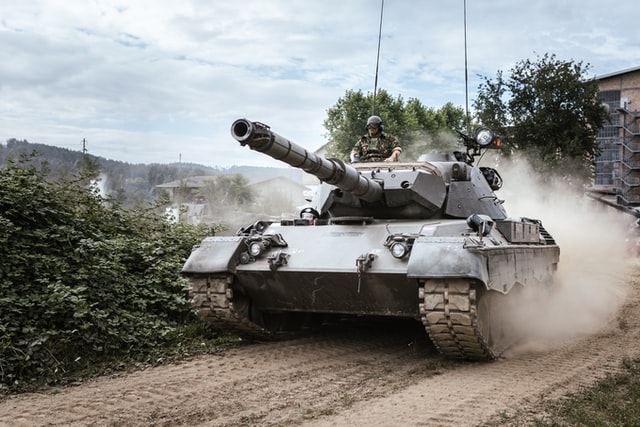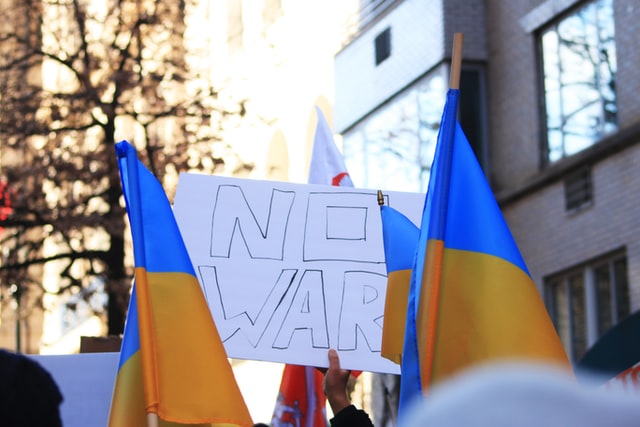Podcast 95 - B2 Words of War and Peace - Ukraine
Comment on the war
We're living in difficult times at the moment - very sad times. I'm referring to, of course, the Russian invasion of Ukraine. I'm going to talk about that today. There aren't many words from the Common European Framework of languages (CEFR) about war. But I'm going to bring some key words in. The podcast, in general, is at a B2 level. So I'm going to talk about the situation in Ukraine to the present day, which is the 1st of March. And I'll also make a little personal comment at the end. So if you can come over to Practising English, I've highlighted some key words to talk about war and peace.
Russia has launched an attack on Ukraine, which is a European country, a democracy of some 44 million people. The Russian president, Vladimir Putin, tore up a peace deal and invaded Ukraine from the north, east and south. The number of dead rises on both sides, and what happens next could put in danger the security of the whole of Europe.

Putin claims that Russia could not be "safe, develop and exist" due to what he states is a constant threat from Ukraine. Airports and military headquarters were hit by missile attacks, and then tanks and other armoured vehicles crossed the Ukrainian border from Russia, the Russian ally, Belarus, and previously annexed Crimea.
Other arguments for invading are obviously false. Putin claims that the Ukrainian democratically elected government is run by a Nazi of the far right, and Russia wants to protect the Ukrainian people from bullying and genocide. However, this is obviously untrue as the Ukrainian President, Volodymyr Zelenskyy is, in fact, Jewish and there has been no genocide in this country under his presidency.
The former president, the pro-Russian Viktor Yanukovych, lost the elections in 2014 to Zelenskyy and Russia reacted by invading Crimea in the same year. Putin also started a rebellion in the Ukrainian eastern provinces of Luhansk and Donetsk, which led to a great deal of fighting between Ukrainian partisans and separatists. In total, some 14,000 lives were lost.
After repeatedly saying that he had no intention to invade Ukraine, Putin’s forces, in the region of 200,000 troops, are now moving in on major cities such as the capital, Kiev. It appears that Russia has already seized Ukraine’s second city, Kharkiv. This morning, there have been reports that a Russian cruise missile struck and destroyed an administrational building in the centre of the city. Another missile attack hit a non-military, residential area and there were dozens of casualties. President Zelenskyy has accused Russia of war crimes and said that civilians had been a deliberate target.
The Ukrainian military have called up reservists consisting of all Ukranian men from 18 to 60 years of age to defend the country against the aggressor. Meanwhile, many Ukrainians have decided to leave the country and are heading towards neighbouring Poland, Hungary, Romania, Moldova and Slovakia as refugees. The EU have suggested that there may be more than 7 million refugees leaving Ukraine.
This is a terrifying time for the Ukrainian people – it is the first time a major power has invaded Europe since World War Two. The rest of Europe sees Putin’s invasion as having brought about dark times for the rest of the continent. Germany’s Chancellor, Olaf Scholz, has warned that "Putin wants a Russian empire", while Zelenskyy has spoken of a new iron curtain closing Russia off from the civilised world.
Nato’s defensive alliance has made clear that it has no intention of sending combat troops to the country of Ukraine. However, many countries in the EU are sending soldiers to Poland and the Baltic states and, at the same time, activating Nato forces in other areas not mentioned but possibly Hungary, Bulgaria, Romania and Slovakia. Moreover, European countries are buying and sending weapons and other equipment including military hospital installations to Ukraine itself.
At the same time the US, Europe and other countries are placing sanctions on Russia. These include targeting Russia’s economic and financial institutions as well as many wealthy individuals, who have built up huge fortunes under Putin’s government.
Comment on peace

I remember, many years ago, my father called me to his office where he was writing on his typewriter - and he showed me a map of the world...
My father was, first and foremost, a pacifist - an active one too. He had studied Esperanto, a language designed by a Polish intellectual, Ludwik Lejzer Zamenhof, at the beginning of the twentieth century. As a language simple in grammar (with no irregular verbs!) and a vocabulary made up of a selection of several living languages, it was an artificial language that was relatively easy to learn and communicate in.
My father loved travelling. He made frequent trips from the UK to Eastern European countries and the Soviet Union before the times of the fall of the Berlin Wall. He enjoyed meeting and getting to know the native people, especially Russians, who he had made initial contact with through available lists of fellow Esperantists around the world. There were, and still are, around a million speakers of Esperanto.
My father made life-long friends on these trips. When he came home, he would tell me so enthusiastically how he had shared meals and hospitality with native Russians and had drunk vodka toasts with them - Nostrovia!
Later in life, and after his travelling days and the fall of the Berlin Wall, my father continued contact with his Russian friends through letter correspondence. They discussed, above all, true peace in the world and the reconciliation between East and West.
...The map my father wanted to show me was a world map from a Russian perspective. Instead of being on the right, Russia was shown in the middle. On both sides sat Russia’s enemies – Europe and the United States. He explained to me that the feeling of threat for Russia was a tangible one – Russia was "trapped" between two hostile regions of the planet.
If we examine the map closer, there are other features that can be pointed out. Modern-day Russia is huge but the core region lies close to its western border – from the Ural Mountains to the borders with Europe. The two major cities, Moscow and St Petersburg, are also in this western region. Moscow is only a three-hour and fifty-minute flight from London. Most of this core area of Russia is land-locked, and although St Petersburg is on the sea, most ships leaving its port must pass through potentially hostile waters to reach other significant ports.
To the south, the long border with Kazakhstan is accessible but relations between the two countries are amicable. However, the borders with the world’s larger powers or possible nations of instability are geographically very difficult to launch an invasion from. The Caucasus Mountains serve as a natural barrier to the Middle East, and mountain ranges and harsh terrain separate Russia from China, India and southern Asia. Even the Urals could be seen as protection from the East to Russia’s core area.
The obvious threat lies to the west. An area called The North European Plain extends from France through to Germany, Poland, The Baltic states and onwards to Moscow. During the times of the Soviet Union, the land as far west as the Carpathian Mountains was under its control. That natural barrier has now disappeared.
As the renowned journalist and world affairs editor, John Simpson, has mentioned recently. Perhaps it was a mistake, when the Berlin Wall came down, to have humiliated Moscow by allowing its old satellite countries in Eastern Europe to join the Nato Alliance. If we no longer had an enemy in Russia, why did we allow these nations to join a Western military agreement?
My father passed away a few years ago now. He believed to understand Russia’s behaviour was by understanding this map. And Vladimir Putin, an ex-KGB official of the past and still hurting on the inside from the collapse of the Soviet Union, still refers to it as significant and vital to Russia’s future.
Above all, my father was a pacifist. As a person who embraced people from all cultures and welcomed everybody with open arms as "citizens of the world", he would have been terribly sad to witness the events of Russia’s cruel and violent invasion of Ukraine. He would have seen no excuse for military aggression against a peaceful nation, as indeed there is none.
Peace in Ukraine!
Copyright © 2023 Practising English
All rights reserved